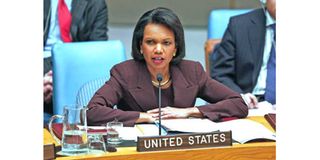Okoti: Lessons I have learnt from Condoleezza Rice

Former US Secretary of State Condoleezza Rice.
What you need to know:
- Beyond just signalling approval that women can head the national boardroom (read Cabinet), it is a step closer to gender mainstreaming in elective politics in Kenya.
- As Kenya joins the ranks of countries with women representation at the apex of political leadership, it’s also an occasion for young women to reflect on what this means for their leadership journeys, whether in business, corporate or politics.
The entrance of Martha Karua into Kenya’s presidential race was a welcome change. Now dotingly seen to as “the Martha factor”, many of us are now following the campaign trail fondly. And for good reason.
Global Gender Gap Report 2020 ranked Kenya at 109 out of 153 countries. The report, which was published by USAid, shows we still have significant gender inequalities in education attainment, health outcomes, representation in Parliament, and participation in the labour market.
This explains why Ms Karua’s nomination as running mate for one of the front-runners in the August 9 poll is something many people are following with interest.
Beyond just signalling approval that women can head the national boardroom (read Cabinet), it is a step closer to gender mainstreaming in elective politics in Kenya. There is more.
Gender agenda
As Kenya joins the ranks of countries with women representation at the apex of political leadership, it’s also an occasion for young women to reflect on what this means for their leadership journeys, whether in business, corporate or politics.
No doubt, personal journeys are unique; peppered by distinctive challenges and flavoured by evolving cultural contexts, technologies and opportunities.
Indeed, Ms Karua only signs the growing list of women leaders around the globe who continue to hold spaces for women.
Time would fail me to talk about pioneers like Nobel Peace Laurate, Prof Wangari Maathai or amazing women at the helm of ministries such as Dr Monica Juma, who, besides her busy schedule and winning awards for excellent work, creates time to host mentoring and networking forums for younger professional women through The Athena (her mentoring platform). Talk about skilling by example!
Other world leaders like Angela Merkel and Ellen Johnson Sir-Leaf also come to mind.
Today, I would like to reflect on three lessons young women can learn from Condoleezza Rice. She has held many positions of global note, including being the 66th US Secretary of State (widely regarded as the most senior in the US Cabinet).
She is currently the director of Hoover Institution (a public policy think tank) at Stanford University. In 2005, Forbes named her one of the most powerful women in the world.
These lessons are drawn from her autobiography, Extraordinary Ordinary People: A Memoir of Family. Her life’s journey, captured in the book, possesses enduring lessons, which, I believe, are not only relevant in our context, but can also enrich young women as they build leadership skills.
Lesson one: Growth will take time. And you may not have everything figured out. But as you keep working on your goals, staying loyal to what you are passionate about, clarity will flow. Condoleezza started out as a piano major. In one of her presentations, she actually says she was a “failed piano major”. What she wanted to do with her life was not always crystal clear.
In fact, she landed on her major by accident. She wandered into a class and loved it! The point? Things may not fall into place from the outset. You may not be sure about your degree, you may not be sure about how your career goals will fit into what you want when you are 60, but as long as you keep making effort, working hard and taking advantage of positive opportunities, you will be well prepared for that big break.
Self-development
Secondly, know what you like and what you dislike. This may take different forms. Defining your personal values, identifying your natural inclinations and building on these. Take up self-development programmes like coaching and mentorship.
Besides helping you highlight how you show up, they help you see yourself in a 360 degrees’ fashion. Condoleezza is clear about the fact that she is a policy, not politics, person.
This explains why she has never bowed down to pressure to consider an elective seat, no matter how many people say she should run for the US presidency.
Another favourite quote comes to mind, “Not everything that is good is good for you.”
Lesson three: Both men and women are important in your leadership journey. Remember the famous #HeforShe? Leadership is a marathon. You cannot do it alone. And men are not merely bystanders on these journeys. Your allies may not always look like what you imagine; they may not always be female.
Condoleezza realised that early in her career. As a black woman in the US, most of her allies were white men. Cultivate your skills, presentation and opinions (by reading widely) about issues as you go along. This way, you will rid yourself of debilitating stereotypes and focus on the right things. These lessons are a just a tip of the iceberg.
Women leaders, globally, have a wealth of experience. Interacting with them through books, interviews and in person will reveal a lot of gems. Their journeys are not mythical, so it’s possible to always draw lessons and learn. If you seek, you will find.
Daisy Okoti is a features writer at NMG; [email protected]; @Dnandeche





